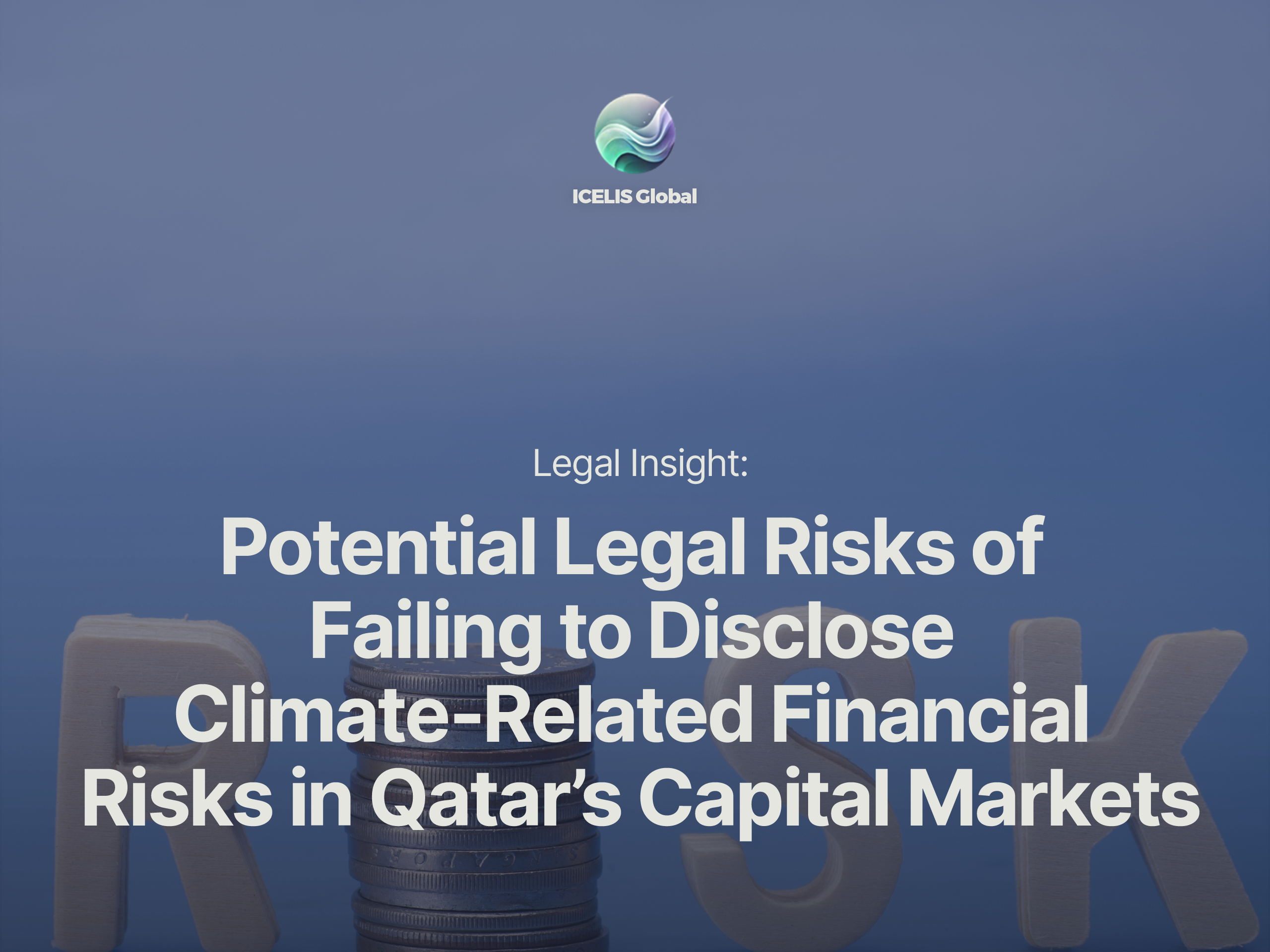Introduction
As climate change intensifies and international investors demand greater transparency, financial regulators worldwide are tightening disclosure frameworks. In Qatar, this trend has accelerated with the proposed adoption of global sustainability standards, specifically the International Sustainability Standards Board (ISSB)’s International Financial Reporting Standards (IFRS) S1 and S2, for capital market reporting. These frameworks will become mandatory for listed entities starting in fiscal year 2026, with disclosures submitted in 2027.
Failure to disclose climate-related financial risks isn’t just a compliance lapse. It carries serious legal, governance, reputational, and financial consequences. From enforcement actions diminished investor trust to potential litigation exposure, inadequate disclosure can impose significant costs on firms.
This ESG insight analyzes Qatar’s evolving regulatory landscape, outlines the legal risks of non‑disclosure, and offers actionable recommendations for companies to stay ahead. Whether you’re a director, sustainability lead, investor, or regulator, understanding these risks is essential in the climate accountability era.
Emerging Regulatory Mandates
Qatar is actively developing a Corporate Sustainability Reporting framework aligned with ISSB (IFRS S1 & S2) standards as evidenced by its GENE (Corporate Sustainability Reporting) and Minor and Technical Amendments Rules 2025 and Guidance on “How to start the journey in applying the International Sustainability Standards Board (“ISSB”) Standards”. Under the rules by Qatar Financial Centre Regulatory Authority (QFCRA), listed firms, including banks, insurers, and other Category A entities, must integrate climate-related financial risk disclosures into their general-purpose financial reports from fiscal year 2026, with the first submissions due in 2027. Even if risks are considered immaterial per ISSB’s guidelines, firms must explicitly state why they are omitted and provide justification.
Failing to comply could constitute regulatory breaches, resulting in reprimands, fines, enforcement actions, or possible exclusion from the QFCRA-regulated capital market segments.
Governance & Fiduciary Responsibilities
While direct litigation by private parties for climate nondisclosure is nonexistent in Qatar, governance norms and regulatory oversight increasingly emphasize accurate risk reporting. QSE is planning to transition from voluntary ESG guidance toward mandatory disclosure rules for all listed companies.
Directors and boards may face scrutiny from regulators or institutional investors if risk management systems are inadequate or climate-related disclosures are misleading. Globally, courts in jurisdictions such as the UK and Australia are beginning to hold directors personally liable for failure to consider climate-related dependencies and impacts, with potential claims for damages, reduced compensation, or removal from office.
Similarly in Qatar, as disclosure guidelines mature and mandatory standards emerge, corporate officers may come under increasing pressure to demonstrate robust governance over climate‑related risk.
Reputational and Financial Investor Risks
Noncompliance, or even voluntary under‑reporting, can damage investor trust. International investors, including major funds like Norway’s Norges Bank Investment Management (NBIM), have voiced strong support for transparent disclosure aligned with ISSB, and expect high-quality, comparable climate information from corporate issuers in Qatar as shown in its letter to the Qatar Financial Centre Regulatory Authority. Failure to align with evolving global ESG standards raises reputational risk, potentially diminishing access to international capital and liquidity, especially as ESG investments grow in regions such as the European Union, United States and the United Kingdom.
Operational and Compliance Risk
Failure to prepare for new disclosure regimes may trigger operational risk (reporting errors, internal control failures) and regulatory legal risk, for example, if material misstatements or omissions are discovered. As disclosure regimes roll out, firms that lack robust climate risk governance may face inquiries, remediation demands, or administrative sanctions from regulators.
Litigation Risk (Indirect but Growing)
Although Qatar currently lacks citizen-based litigation mechanisms on climate matters, global trends suggest this may evolve. In other jurisdictions, including Australia, New Zealand, and the United Kingdom, shareholders or public agencies have launched cases alleging failures by companies or boards to manage climate and nature‑related risks.
Should Qatar permit third‑party standing in the future (e.g., under corporate governance or environmental law reforms), boards and companies who neglect climate‑risk disclosure could face derivative suits or regulatory investigations.
Recommendations for Listed Companies
• Get ahead of the curve by aligning internal processes with ISSB standards (IFRS S1/S2) ahead of mandatory adoption in 2026/27.
• Institute governance structures (e.g. climate committees, board oversight) to assess and manage climate‑related financial risks.
• Ensure internal controls and assurance frameworks are in place. QFCRA aims to adopt assurance standards like ISSA 5000 for sustainability reporting
• Conduct rigorous materiality assessments and transparently justify any omitted climate-related disclosures.
• Engage with stakeholder expectations, especially from international institutional investors demanding consistent and comparable ESG data.
Final Thoughts
Although Qatar has not yet seen private climate‑related litigation, the country is rapidly shifting toward mandatory climate-related financial disclosure in its capital markets. That shift carries real legal, governance, operational, and reputational risks for companies that do not prepare. Firms that act proactively, aligning with ISSB standards, strengthening board oversight, and ensuring high-quality disclosures will be best positioned to
